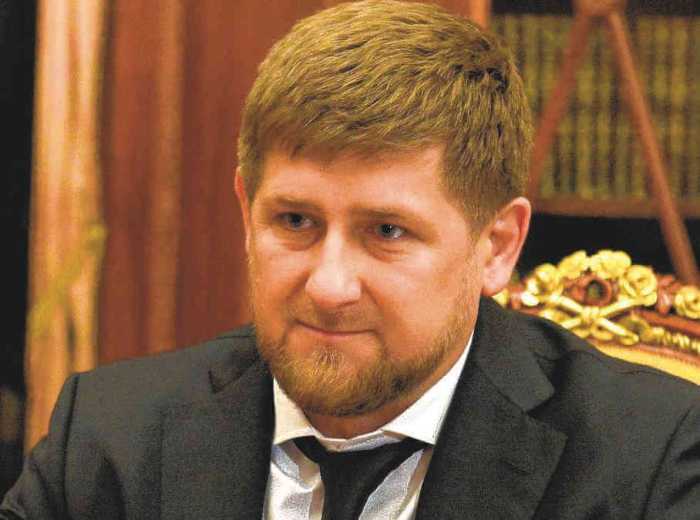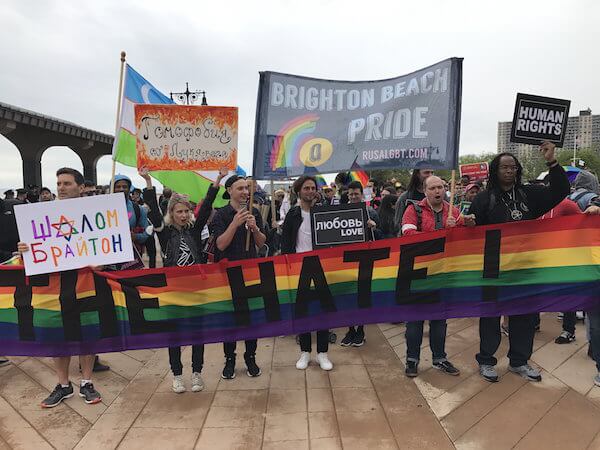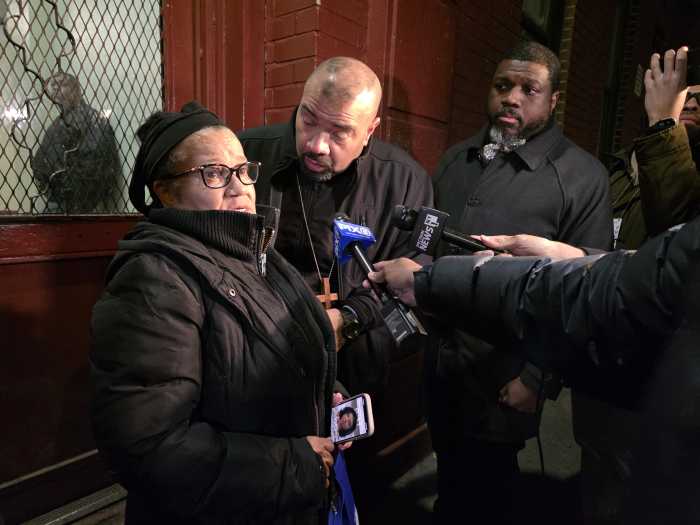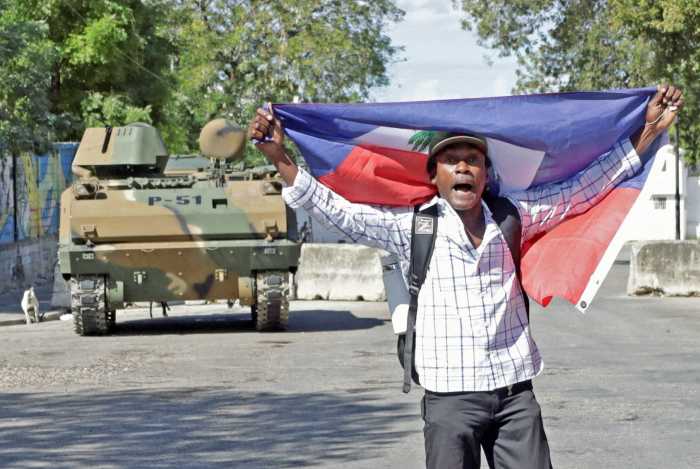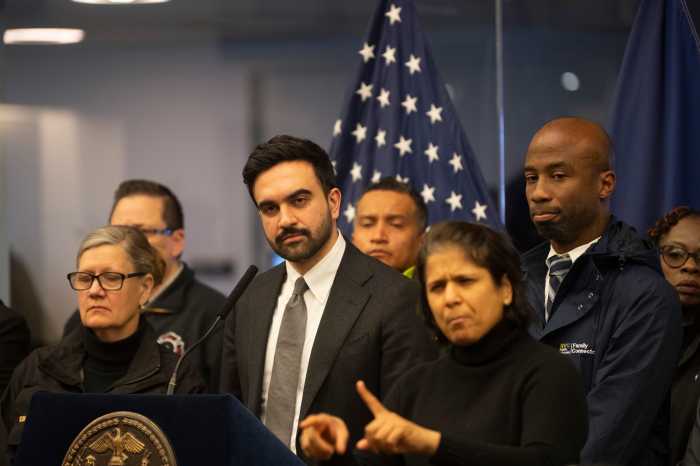I recently went to a march in New York organized by Voices 4 Chechnya and RUSA LGBT demanding that the US welcome queer Chechen refugees who are being tortured and murdered by the brutal regime of Putin faithful Ramzan Akhmadovich Kadyrov.
I’d heard a lot about how gay men and trans women in Chechnya were targeted by police stings, and often kidnapped, but very little about lesbians. During the pre-march rally in front of the Stonewall Inn, one woman read a message from a Chechen lesbian who reminded us that they were being attacked, too.
If lesbians were invisible in this “cleansing,” it was because of women’s lowly status in Chechnya, she explained. Unlike gay men, they simply didn’t have a chance to escape. Women were barely allowed to leave the house, and were almost never permitted to study or work abroad. So, rather than sending them to jail and torturing or killing them there if they were discovered to be lesbians, the cops or their neighbors or relatives would simply pressure their immediate family to do the bloody deed at home, behind closed doors. And they often did — with complete impunity.
I was grateful they featured that story at the rally. It’s time we talk more about how the experiences of gay men and lesbians are different. Even lesbians don’t talk much about lesbians anymore — at least in the US. Perhaps because many of us have abandoned that word. Young queer women say it’s too final. Too fixed. Not to mention the fact that it’s so terrifyingly efficient, that in a mere two and a half syllables, it identifies sex and sexual identity, and with a loud, perverted BANG! effectively slams the door on heterosexual female privilege.
It’s also true that we’re used to keeping quiet about our own abuse. Even though women broke our silence this week on social media speaking out about our experiences of sexual violence and harassment, none of the lezzies I know, including me, talked about how this had affected us as dykes. Perhaps we don’t think it did. Or we don’t feel entitled to ask ourselves the question, and examine this nightmare, much less talk about it, through the lens of our insignificant unlabeled lives.
Do I sound bitter? I hope so. When I recently suggested to a bunch of dykes that they incorporate a focus on lesbians into their work for women, for queers, for immigrants, against mass incarceration or racism or poverty, nobody spoke in agreement. In fact, one woman sneered and said her work was too important to wait until she found some token lesbian case. As if we weren’t already present. Facing job discrimination. Going to jail far more often than straight-seeming women when faced with the same charge. As if we didn’t face violence, harassment, marginalization. As if black dyke lives didn’t matter. And they don’t. Let’s be honest. None of our dyke lives count.
If we don’t have enough anecdotal evidence proving how trifling we are, it’s there in dollars and cents. Out of 424 million dollars budgeted for international LGBTI issues in 2013-2014, only a measly two percent went toward projects for LBQ (lesbian, bi, queer) women. And out of hundreds of recommendations put forward at the United Nations in recent years, only one addressed specifically lesbian issues.
Those figures come from the first European Lesbian* Conference that took place early this month in Vienna, and they were the proverbial last drop that pushed the organizers into action. (They should crunch the numbers for women’s projects, too, which I suspect are no more eager to embrace lesbian issues than queer NGOs often headed by gay men.)
The two researchers who presented a report to the conference on lesbian lives in Europe discovered that we were almost on par with unicorns when it came to mining data even among countries in the relatively progressive European Union.
This meant that not only were they limited in the conclusions they could draw, but that we would hit a brick wall if we wanted to propose a project on lesbian mental health, for instance, because we wouldn’t have enough figures proving it was needed or to create a model for how it might work. Ditto for projects addressing violence against lesbians. No data. Therefore, no funding. And no action. As a result, almost every researcher at the conference begged the lesbian participants from Iceland to Uzbekistan to get involved collecting data on their own communities.
The second, equally repeated request, was for lesbians to come out, and stay out, both online and in real life. This visibility tells young lesbians they aren’t alone and creates room to maneuver for all those who can’t risk coming out, especially in cultures where all women are excluded not only from politics and culture, but from public spaces like parks, streets, cafés.
Oh, and even though they added the asterisk, acknowledging some felt more comfortable with other words, they insisted we use the word, lesbian*. Because a word is not just a word. In practical terms, lesbian is the only word so far that includes all of what we are. As much as I like “queer,” it fails us with its masculine default. And while a word like “fluid” may be accurate for some, or even many, it not only sidelines gender, but hedges its sexual bets, conveniently leaving the door open to straight privilege. One Ukrainian dyke called a refusal to use the word lesbian flat-out homophobic. I’d say there’s misogyny at play as well.
This erasure of “lesbian” and the return to the linguistic closet has real world consequences — less political power, less funding, less research, more invisibility. Visibility is key not just to power, but hope, solidarity, and even joy, if you judge by the ecstatic faces at the lesbian march through the center of Vienna on the last night of the conference. Words also give people ideas. It’s why when homosexuality was outlawed — again — in Britain in 1921, they, too, refused to include the word lesbian. During the debate in the House of Lords, the Earl of Malmesbury famously explained, “The more you advertise vice by prohibiting it, the more you will increase it.” We can only hope.
Kelly Cogswell is the author of “Eating Fire: My Life as a Lesbian Avenger,” from the University of Minnesota Press.


